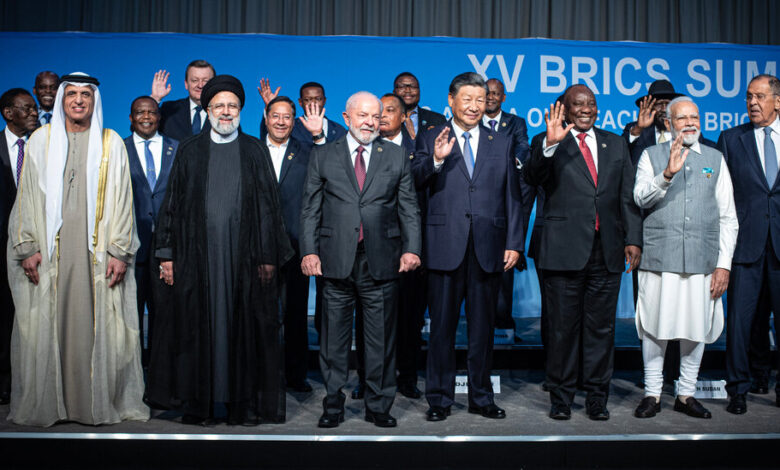With BRICS Invite, Iran Shrugs Off Outcast Status in the West

Over the past 12 months, Iran has lurched from crisis to crisis.
An uprising led by women and young people seeking an end to clerical rule reverberated across the nation. High food prices intensified a long downward spiral of the economy. Violent crackdowns by Iranian security forces on the voices of dissent prompted widespread outrage abroad. And the prospect of a nuclear deal with the United States appeared ever more dim.
But then came a surprise announcement on Thursday that the country had been invited to join BRICS, a group of emerging economies aiming to act as a counterweight to Western dominance of the world order. Iranian officials immediately declared a victory, boasting about their country’s “historic achievement” and talking up its potential as a trade partner and as an ideological disrupter of Western hegemony.
Analysts agreed that it was a political win for the Islamic Republic after a year of turmoil in which it faced a severe crisis of legitimacy at home and abroad.
Although joining BRICS is not expected to help solve Iran’s formidable economic problems, the primary benefit of joining the group, experts say, would be to prove that Tehran has powerful friends. That could give it leverage in any further negotiations with the United States.
“Part of the government’s message, both to external and internal audiences, is that they are not going anywhere and they have the validation of some major powers in the world,” said Henry Rome, a senior fellow at the Washington Institute for Near East Policy, a think tank.
That validation, according to Sasan Karimi, a political analyst in Tehran, was a form of reward for forging closer ties with both China and Russia. Iran has provided drones to Russia that are being used in the war against Ukraine and, evading sanctions, sells discounted oil to China, whose economy is struggling.
Iran is one of six nations invited to join the group at a meeting in South Africa this week; the others are Argentina, Egypt, Ethiopia, Saudi Arabia and the United Arab Emirates. They would join Brazil, Russia, India, China and South Africa, for whom the BRICS acronym was coined.
The invitations underlined the odd quality of the grouping — which includes democracies and authoritarian states — and would have no clear political coherence except in the desire to reshape the current global financial and governing system to one that is more diverse and less subject to American politics and the power of the dollar.
The inclusion of Iran comes as the geopolitics of the Middle East become increasingly complex, with some U.S. allies in the region chafing at their partnerships with Washington. Both Saudi Arabia and the United Arab Emirates have been increasingly going their own way on issues like oil production, the war in Ukraine and their relationships with Iran and Syria.
Underlining the importance of the BRICS event for Iran, President Ebrahim Raisi, a hard-line cleric who is increasingly unpopular at home for his inability to fix the mounting domestic crises facing his nation, traveled to personally accept the invitation in South Africa.
“The Islamic Republic of Iran has extraordinary potential and it stands ready to cooperate in all three main pillars of BRICS — political, economic and security,” Mr. Raisi said in a speech.
The economic problems Iran faces will be difficult to solve. Decades of mismanagement and corruption, compounded by American sanctions aimed at curbing Iran’s nuclear and missile programs that ban the country from international banking transactions and selling oil, have contributed to devastating the economy.
So-called secondary U.S. sanctions, which target people and entities doing business with Iran, present another obstacle for reaping the full financial benefits of membership in a group like BRICS. For example, Iran will still most likely be unable to obtain a loan from a development bank set up by BRICS countries, analysts said.
The invitation to join BRICS is the culmination of months of diplomatic activity by Iran, which has the second-largest gas reserves in the world, after Russia, and a quarter of the oil reserves in the Middle East, and which views itself as a regional power player rivaling Saudi Arabia.
Iran resumed diplomatic ties with Saudi Arabia, after years of enmity between the two countries, in a deal brokered by China; joined the Shanghai Cooperation Organization, a Chinese-led regional grouping; reached a prisoner swap deal with the United States under which it recovered $6 billion in funds that had been frozen in South Korea; and secured an informal agreement with the United States aimed at defusing tensions between the two countries.
“When you add all of this up, from a broader perspective, Iran is certainly not as isolated as a year ago,” said Mr. Rome at the Washington Institute for Near East Policy.
For Iran, the pivot east was partly prompted by the decision by former President Donald J. Trump in 2018 to take the United States out of a nuclear deal reached with Iran by the Obama administration three years earlier — despite Tehran’s full compliance — and to impose sanctions. European companies conducting business in Iran withdrew from the country.
Subsequently, the Iranian government said that it could no longer trust the West nor rely on it for economic development, and shifted policy, moving closer to Russia and China. It also accelerated its nuclear program to levels far beyond those agreed in the deal.
In 2021, Iran and China signed a sweeping economic and security agreement under which China agreed to invest $400 billion in Iran over 25 years in exchange for a steady supply of discounted Iranian oil, which has helped Iran stay afloat economically. In June, commodity data providers said that Iran was selling about 1.6 million barrels a day — levels last seen in 2018 when the nuclear deal was still in place — with China being its top customer.
Iran and Russia have also forged closer security and military ties, which strengthened after Iran became one of the few countries that endorsed Russia’s invasion of Ukraine. Iran has provided Russia with drones that the Kremlin has used to target Ukraine, and senior Iranian military commanders frequently travel to Moscow. The United States said in April that it had intelligence that Iran was helping Russia build a drones manufacturing company east of Moscow that could be operational next year.
Iran has also diversified its economy away from oil and increased trade with other countries. With the five members of the BRICS group before the latest expansion, for example, non-oil trade from Iran increased 14 percent, to $38.43 billion, in the 2022-23 fiscal year, according to Iranian news reports citing official customs data.
“These relevant successes in foreign policy don’t improve the domestic situation but it does give Iran leverage against the U.S.,” said Mr. Karimi, the Tehran-based analyst. “Iran can claim the U.S. has failed to isolate it politically and break it economically and go into negotiations challenging Americans with newfound confidence.”
Even as Iran engages in diplomacy to raise its profile abroad, a struggle continues at home between people seeking greater freedoms and a government adamant in crushing them.
The one-year anniversary of the death of a young woman, Mahsa Amini, in the custody of the morality police, which sparked the uprising, is approaching in mid-September and activists say they will mark the occasion with more protests and acts of civil disobedience. The judiciary has warned that demonstrators will be severely punished, and the security forces have begun a sweeping crackdown on women’s rights activists, students, dissidents and families of people killed in the protests.
Many Iranians and activists view the recent efforts by some countries to woo Iran as a blow to their aspirations for democratic change.
Gissou Nia, a rights lawyer affiliated with the Atlantic Council in Washington who has worked extensively on Iran, said that the timing of the diplomatic overtures to Iran, and particularly the BRICS membership, would “undoubtedly extend the regime’s lifeline through economic support.”
“The ultimate loser in all this are the Iranian people — who feel unrepresented and unsupported by their unelected head of state and unaccountable government,” Ms. Nia said.




